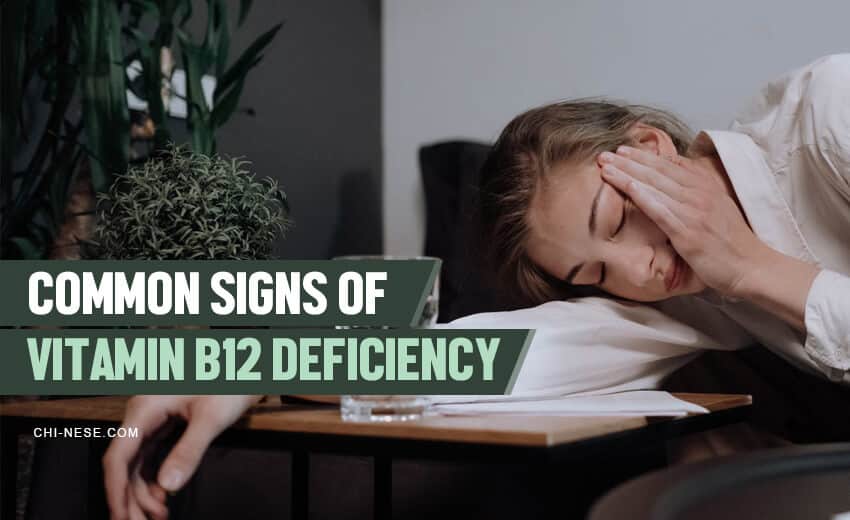Do you often feel tired and drained? If so, you could be one of the millions of people who are deficient in vitamin B12! This essential nutrient is responsible for fueling your body, keeping you energized, maintaining the health of nerve cells, and helping to make DNA and red blood cells.
Signs of vitamin B12 deficiency can be hard to detect, as they often mimic other conditions. However, it is important to be aware of the symptoms, as left untreated, vitamin B12 deficiency can lead to serious health complications.
There are a number of signs that can indicate whether or not you’re lacking in B12. Read on to learn about the most common ones.
Difficulty concentrating or feeling foggyheaded
B12 is essential for the formation of myelin, the protective covering that surrounds nerve cells. Without myelin, nerve cells cannot communicate properly, which can lead to problems with concentration, focus, and thinking clearly.
People who have difficulty concentrating often feel like they are constantly behind and struggling to catch up. This can also lead to feelings of frustration and anxiety, therefore, it is important to start looking for the cause, talk to your doctor about getting tested.
Weakness and lightheadedness when standing up quickly
When you stand up quickly, the sudden decrease in blood pressure can cause a momentary drop in blood flow to the brain, leading to lightheadedness.
This is usually nothing to worry about and will usually go away within a few seconds. However, if you experience lightheadedness often or it lasts for more than a few seconds, it could be a sign of a deficiency in vitamin B12.
There are a few possible explanations for why you might experience lightheadedness when standing up quickly if you are deficient in vitamin B12. One potential explanation is that low levels of B12 can lead to anemia, which is a condition characterized by reduced levels of red blood cells or hemoglobin in the blood. When someone is anemic, they may feel lightheaded or dizzy when standing up because their body isn’t able to deliver enough oxygenated blood to the brain.
Another possibility is that low levels of B12 can cause nerve damage, and this nerve damage can lead to symptoms like lightheadedness and dizziness.
Feeling tired or fatigued all the time
Vitamin B12 is essential for energy production and supports the health of your nervous system. Without it, you may feel run-down, exhausted, or fatigued all the time.
If you’re feeling fatigued all the time and you think you might have a vitamin B12 deficiency, it’s important to see your doctor for a diagnosis. The best way to determine whether or not you have a B12 deficiency is with a blood test. If your levels are low, your doctor may prescribe supplements to help boost your levels back up to normal.

Joint pain and muscle aches
Vitamin B12 deficiency is damaging the nerves and can lead to problems with movement and coordination, as well as feelings of numbness or tingling in your hands and feet. Low levels of vitamin B12 can also cause inflammation in the joints, leading to pain and stiffness.
Pale skin color
Pale skin is not specifically a sign of vitamin B12 deficiency. However, a lack of this important vitamin can lead to a condition called megaloblastic anemia, which is characterized by a decrease in the number of red blood cells, and by pale skin color.
If you suspect vitamin B12 deficiency, and you’ve never had pale skin color before, this is one of the signs you should remember.
What Foods To Eat To Increase The Amount of Vitamin B12?
There are a few different foods that you can eat to increase the amount of vitamin B12 in your diet. Some good sources of vitamin B12 include:
- fish
- shellfish
- poultry
- meat
- eggs
- dairy products
You can also get B12 from fortified foods like breakfast cereals and soy products. This is especially suitable for vegans, who often suffer from vitamin B12 deficiency. Dietary supplements are another option for vegans to supplement their vitamin B12 dose.
Bottom Line
So, what does this all mean for you? It’s simple. You need to be sure that you are getting enough vitamin B12 in your diet. The best way to do this is by eating foods that are fortified with the nutrient or taking a supplement. If you think you might be deficient in B12, talk to your doctor about getting tested. They can help you determine whether or not you need to take supplements and how much you should be taking. And don’t forget, if you are pregnant or breastfeeding, it’s especially important that you make sure you are getting enough B12 in your diet!








